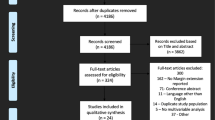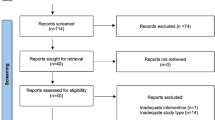Abstract
Context:
There is a growing interest about the role of radical prostatectomy (RP) in local cancer control in oligometastatic prostate cancer (PCa).
Purpose:
To evaluate the oncological and functional outcomes of RP in the management of oligometastatic PCa through a systematic review.
Methods:
A systematic review search was performed and the following bibliographic databases were accessed: PubMed, Scopus, Embase and the Cochrane central register of controlled trials were searched from January 2000 to November 2022. This was carried out by the Preferred Reporting Items for Systematic reviews and Meta-analyses (PRISMA) guidelines.
Results:
Based on the literature search of 384 articles, 11 (511 patients) met the inclusion criteria (mean age: 65.5 yr.). Positive surgical margins were 59%. Median follow-up ranged from 13 to 64 months. Clinical progression-free survival ranged from 56% at 3 years to 45% at 7 years. Specific and overall survival rates ranged from 60 to 80.5% and 78 to 80% at 5 years, respectively. Clavien ≥3 complications ranged from 0 to 21%. The urinary incontinence rate was 14.5%.
Conclusions:
Similar to published studies, RP of oligometastatic PCa appears to be safe with acceptable morbidity in selected patients. The lack of a consensual definition, the low level of evidence and the bias of the comparative and retrospective studies available do not allow practical recommendations to be made. There is currently no place for metastatic surgery outside of participation in a clinical trial.
This is a preview of subscription content, access via your institution
Access options
Subscribe to this journal
Receive 4 print issues and online access
$259.00 per year
only $64.75 per issue
Buy this article
- Purchase on Springer Link
- Instant access to full article PDF
Prices may be subject to local taxes which are calculated during checkout

Similar content being viewed by others
References
Stevens DJ, Sooriakumaran P. Oligometastatic prostate cancer. Curr Treat Options Oncol. 2016;17:62.
Reyes DK, Pienta KJ. The biology and treatment of oligometastatic cancer. Oncotarget. 2015;6:8491–524.
Boevé LMS, Hulshof MCCM, Vis AN, Zwinderman AH, Twisk JWR, Witjes WPJ, et al. Effect on survival of androgen deprivation therapy alone compared to androgen deprivation therapy combined with concurrent radiation therapy to the prostate in patients with primary bone metastatic prostate cancer in a prospective randomised clinical trial: data from the HORRAD trial. Eur Urol. 2019;75:410–8.
Parker CC, James ND, Brawley CD, Clarke NW, Hoyle AP, Ali A, et al. Systemic Therapy for Advanced or Metastatic Prostate cancer: Evaluation of Drug Efficacy (STAMPEDE) investigators. Radiotherapy to the primary tumour for newly diagnosed, metastatic prostate cancer (STAMPEDE): a randomised controlled phase 3 trials. Lancet. 2018;392:2353–66.
Cornford P, van den Bergh RCN, Mottet N. EAU-EANM-ESTRO-ESUR-SIOG Guidelines on Prostate Cancer. Part II-2020 Update: Treatment of Relapsing and Metastatic Prostate Cancer. Eur Urol. 2021;79:263–82.
Solberg A, Haugen OA, Viset T, Bergh A, Tasdemir I, Ahlgren G, et al. Residual prostate cancer in patients treated with endocrine therapy with or without radical radiotherapy: a side study of the SPCG-7 randomized trial. Int J Radiat Oncol Biol Phys. 2011;80:55–61.
Tzelepi V, Efstathiou E, Wen S, et al. Persistent, biologically meaningful prostate cancer after 1 year of androgen ablation and docetaxel treatment. J Clin Oncol. 2011;29:2574–81.
Knoll T, Omar MI, Maclennan S, et al. Key steps in conducting systematic reviews for underpinning clinical practice guidelines: methodology of the European Association of urology. Eur Urol. 2018;73:290–300.
Moga C, Guo B, Schopflocher DP, Harstall C. Development of a quality appraisal tool for case series. Stud Using a Modif Delphi Tech (2012).
Heidenreich A, Pfister D, Porres D. Cytoreductive radical prostatectomy in patients with prostate cancer and low volume skeletal metastases: results of a feasibility and case-control study. J Urol. 2015;193:832–8.
Gandaglia G, Fossati N, Stabile A, Bandini M, Rigatti P, Montorsi F, et al. Radical prostatectomy in men with oligometastatic prostate cancer: results of a single-institution series with long-term follow-up. Eur Urol. 2017;72:289–92.
Sooriakumaran P, Karnes J, Stief C, Copsey B, Montorsi F, Hammerer P, et al. A multi-institutional analysis of perioperative outcomes in 106 men who underwent radical prostatectomy for distant metastatic prostate cancer at presentation. Eur Urol. 2016;69:788–94.
Steuber T, Berg KD, Røder MA, Brasso K, Iversen P, Huland H, et al. Does cytoreductive prostatectomy really have an impact on prognosis in prostate cancer patients with low-volume bone metastasis? Results from a prospective case-control study. Eur Urol Focus. 2017;3:646–9.
Poelaert F, Verbaeys C, Rappe B, Kimpe B, Billiet I, Plancke H, et al. Cytoreductive prostatectomy for metastatic prostate cancer: first lessons learned from the multicentric prospective LoMP trial. Urology. 2017;106:146–52.
O’Shaughnessy MJ, McBride SM, Vargas HA, Touijer KA, Morris MJ, Danila DC, et al. A pilot study of a multimodal treatment paradigm to accelerate drug evaluations in early-stage metastatic prostate cancer. Urology. 2017;102:164–72.
Jang WS, Kim MS, Jeong WS, Chang KD, Cho KS, Ham WS, et al. Does robot-assisted radical prostatectomy benefit prostate cancer patients with bone oligometastases? BJU Int. 2018;121:225–31.
Heidenreich A, Fossati N, Pfister D, Suardi N, Montorsi F, Shariat S, et al. Cytoreductive radical prostatectomy in men with prostate cancer and skeletal metastases. Eur Urol Oncol. 2018;1:46–53.
S Knipper, B Beyer, P Mandel, P Tennstedt, D Tilki, T Steuber et al. Outcome of patients with newly diagnosed prostate cancer with low metastatic burden treated with radical prostatectomy: a comparison to STAMPEDE arm H. World J Urol. 2020;38:1459–64.
Lan T, Chen Y, Su QJ, Ye JJ. Oncological outcome of cytoreductive radical prostatectomy in prostate cancer patients with bone oligometastases. Urology. 2019;131:166–75.
Si S, Zheng B, Wang Z, Niu Z. Does surgery benefit patients with oligometastatic or metastatic prostate cancer? - A retrospective cohort study and meta-analysis. Prostate. 2021;81:736–44.
Hellman SWR. Oligometastases. J Clin Oncol. 1995;13:8–10.
Lecouvet FE, Oprea-Lager DE, Liu Y, Ost P, Bidaut L, Collette L, et al. Use of modern imaging methods to facilitate trials of metastasis-directed therapy for oligometastatic disease in prostate cancer: a consensus recommendation from the EORTC Imaging Group. Lancet Oncol. 2018;19:e534–e545.
Wuttig D, Baier B, Fuessel S, et al. Gene signatures of pulmonary metastases of renal cell carcinoma reflect the disease-free interval and the number of metastases per patient. Int J Cancer. 2009;125:474–82.
Tosoian JJ, Gorin MA, Ross AE, Pienta KJ, Tran PT, Schaeffer EM. Oligometastatic prostate cancer: definitions, clinical outcomes, and treatment considerations. Nat Rev Urol. 2017;14:15–25.
Liu Y, Dong Y, Kong L, Shi F, Zhu H, Yu J. Abscopal effect of radiotherapy combined with immune checkpoint inhibitors. J Hematol Oncol. 2018;11:104.
Abrahamsson PA. Potential benefits of intermittent androgen suppression therapy in the treatment of prostate cancer: a systematic review of the literature. Eur Urol. 2010;57:49–59.
Heidenreich A, et al. EAU guidelines on prostate cancer. Part II: treatment of advanced, relapsing, and castration-resistant prostate cancer. Eur Urol. 2014;65:467–79.
Culp SH, Schellhammer PF, Williams MB. Might men diagnosed with metastatic prostate cancer benefit from definitive treatment of the primary tumour? A SEER-based study. Eur Urol. 2014;65:1058–66.
Gratzke C, Engel J, Stief CG. Role of radical prostatectomy in clinically non-organ-confined prostate cancer. Curr Urol Rep. 2014;15:455.
Comen E, Norton L, Massague J. Clinical implications of cancer self-seeding. Nat Rev Clin Oncol. 2011;8:369–77.
Bayne CE, Williams SB, Cooperberg MR, et al. Treatment of the primary tumor in metastatic prostate cancer: current concepts and future perspectives. Eur Urol. 2016;69:775–87.
Koo KC, Dasgupta P. Treatment of oligometastatic hormone-sensitive prostate cancer: a comprehensive review. Yonsei Med J. 2018;59:567–79.
Moris L, Cumberbatch MG, Van den Broeck T, Gandaglia G, Fossati N, Kelly B, et al. Benefits and risks of primary treatments for high-risk localized and locally advanced prostate cancer: an international multidisciplinary systematic review. Eur Urol. 2020;77:614–27.
Kleinclauss F, Thiery-Vuillemin A. Prise en charge du cancer de la prostate oligo-métastatique. Progrès en urologie. 2019;29:S20–S34.
Author information
Authors and Affiliations
Contributions
AS, AO: protocol/project development. AS, AO, AT: data collection or management. AS, AT, HD, AM, JBB, IZ, ND, GP, AO: data analysis.
Corresponding author
Ethics declarations
Competing interests
The authors declare no competing interests.
Additional information
Publisher’s note Springer Nature remains neutral with regard to jurisdictional claims in published maps and institutional affiliations.
Supplementary information
Rights and permissions
Springer Nature or its licensor (e.g. a society or other partner) holds exclusive rights to this article under a publishing agreement with the author(s) or other rightsholder(s); author self-archiving of the accepted manuscript version of this article is solely governed by the terms of such publishing agreement and applicable law.
About this article
Cite this article
Saouli, A., Touzani, A., Martini, A. et al. Is there a role for radical prostatectomy in the management of oligometastatic prostate cancer? A systematic review. Prostate Cancer Prostatic Dis (2023). https://doi.org/10.1038/s41391-023-00752-5
Received:
Revised:
Accepted:
Published:
DOI: https://doi.org/10.1038/s41391-023-00752-5
This article is cited by
-
Prostatectomy in oligometastatic prostate cancer: a call for high-quality evidence
Prostate Cancer and Prostatic Diseases (2024)



